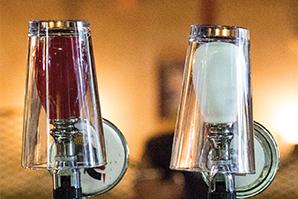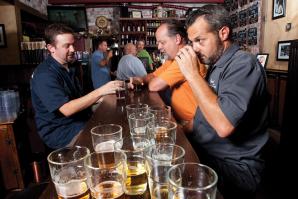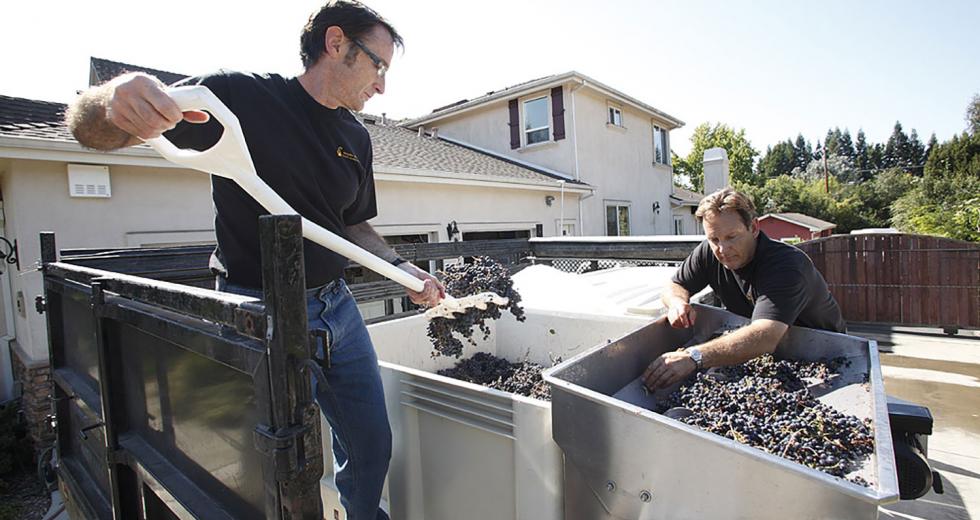Michael Frenn was a committed Coors Light drinker. For him, it was as American as baseball and apple pie.
About a decade ago, he was offered a friend’s home-brew at a party. “He gave me the nastiest thing I had ever tried … but then I thought, ‘Maybe I can make some Coors Light.’” Now, he’s making beer like it’s his job. Eventually, it could be.
Frenn, a 52-year-old Placerville resident who works in the state’s Disaster Medical Services Division, has been brewing beer in his detached garage for the past 10 years.
This summer he wrangled a sales license for his home-brewed creations, making his company, Old Hangtown Beer Works, Placerville’s only self-described “nanobrewery.”
Technically, his license says he is a small beer manufacturer and distributer.
“I am reasonably certain that I’m the smallest microbrewery in the state, if not the country,” says Frenn, who is attempting to have that claim certified by the Colorado-based Brewers Association, of which he is a member.
At full steam, Frenn can produce about 120 gallons a month.
Commercially licensed residential breweries are rare, but for the business-savvy brewer, they are possible. Frenn’s wife got him started with a $60 kit for his birthday.
It’s about the same cost to start making homemade wine.
“As a member in our club, it costs less than $100 because we have equipment and assistance you can use,” says Lynn Keay, president of the Sacramento Home Winemakers association. “But even without the equipment, you could makeshift and make two cases for $100. Ultimately though, you get hooked.”
Brewing at home is also a hell of a good time, says Stuart Spoto, a commercially licensed residential winemaker in Sacramento.
“I pinch myself every morning when I wake up a winemaker,” he says. “If I can continue to do this for another 10 years, and I think I have that in me, it’s a dream come true.”
Spoto has been making wine commercially at his Arden Oaks home for the past six years. He focuses his small-batch efforts on Bordeaux blends and Cabernets sourced from Oakville. They retail between $40 and $75 a bottle, and have stood against some of Napa’s finest at regional competitions.
“I started with a hand-me-down de-stemmer and a borrowed basket press,” he says. “My business plan was not to sink a lot of capital in, but to use profits to buy a new piece of equipment each year.”
Overcoming a stigma of poor quality has made him eager to play up every success and positive review.
“People don’t take it seriously,” he says. “I have really worked on getting the word out. Every time there is a favorable article written, sales have gone up. They hear about the high quality and the low volume, and it helps. Five hundred cases (a year) is really my limitation. Beyond that it gets to be a lot more work. It’s a lot of work now, but I enjoy it.”
For Frenn, getting started was easy. He filed an application with the state and the federal government, paid some money and got to hang his own public notice of application to sell alcoholic beverages on the side of his house.
Things did not go so smoothly for Spoto.
“In 2004, I had my business plan and my whole concept of how I was going to take a home winery — which is anything shy of three barrels of wine — and turn it into a for-profit business,” he says. “I wanted to sell the wine I was currently making and pay my taxes. They looked through the codebooks and said no. They said I needed to be zoned commercially. And secondly, I had to be on a minimum of five acres. But I’m not growing grapes; I’m just producing wine. I thought there had to be some leeway. They said there was no option: ‘There’s the door. Leave.’”
Later, Spoto was lamenting to a friend who knew a lobbyist who knew Sacramento County supervisor Roger Dickinson, who could possibly pull some strings.
Spoto was on his way.
“The bottom line was that they didn’t want to change the feel of the neighborhood, and I didn’t either,” he says. “After about five years, I’m about ready to turn a profit.”
Turning a profit is still in the future for Frenn, who says he really isn’t planning to get rich off Old Hangtown anyway. Right now he’s just covering costs, which are relatively minimal for his award-winning suds because he brews them on top of the pool table between a cord of firewood and a tool bench.
“This wasn’t designed to be a moneymaker. It was designed to get our name established,” he says. “It’s been a dream of mine for a number of years to have a pub, and that’s really the endgame.”
To get to that point, he and his wife, Ramona, have been “busting hiney” for attention at competitions and local watering holes. A month after receiving his license, Frenn entered his beers at Placerville’s Bell Tower Brewfest.
The lager took third place and the stout took best in show against the likes of Sudwerk, Hoppy Brewing Co. and other regional heavy hitters.
“This is no longer grab-ass home-brewing,” Frenn says. “Yeast maintenance is an issue. I had to line up accounts and do tastings. I had to write policies and procedures for myself. I had more problems with the private sector than with the government.
“You have to send a bond guarantee with your taxes when you file your federal application. We had a really hard time finding an insurance company that understood brewers’ bonds.”
Frenn’s business plan was designed around brewing about a barrel each weekend, but that hasn’t been reality. Weekends are full of festivals and events, so he has been brewing after work and into the wee hours of the night.
Between his launch in June and the end of October he had already sold more than 20 barrels and wiggled his beer into taps at the Brick Oven Pub in Placerville and the River Shack in Coloma, among others. He is looking to expand to Folsom.
“People appreciate the beer. I honestly can’t make enough of it. I could sell three times what I’m doing if I had time for it,” Frenn says. “If we can stay at this and I don’t have a heart attack, year two is going to be even more fun.”
Recommended For You

Tapped Out
Is Sac's craft beer bubble on the verge of bursting?
When downtown Sacramento’s Brew It Up poured its last beer in 2011, owner Michael Costello lost more than his business. “I lost everything,” he says. “Nobody really knows the whole breadth of it. It’s not an easy thing to go through.”

Return to Hops
Craft beers gain momentum in the Capital Region
“I arrived in the City of Saloons,” wrote Mark Twain upon arriving here in 1866. “You can shut your eyes and march into the first door you come to and call for a drink, and the chances are that you will get it.”



